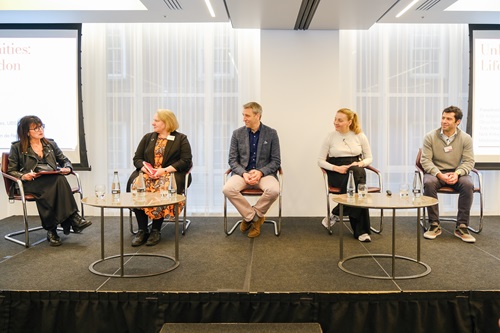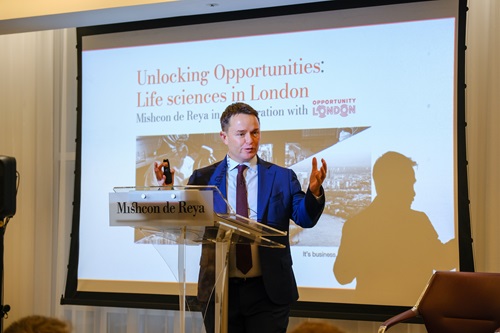
In January, Mishcon de Reya collaborated with Opportunity London to deliver our event Unlocking Opportunities; discussing life sciences in London.
Speakers
- Jace Tyrrell (CEO, Opportunity London)
- George Beaton (EMEA Life Sciences Research Lead, JLL)
Panellists
- Dr Angela Kukula (CEO, Med City)
- Olivia Drew (Director and Portfolio Manager, Real Estate and Private Markets, UK Life Sciences, UBS)
- Toby Reid (Executive Director, Pioneer Group)
- Nick Kirby (Partner, Commercial Real Estate, Mishcon de Reya)
Moderator
Opportunity London
In his second month as CEO of Opportunity London, Jace Tyrrell opened the discussion by detailing how this new public-private partnership aims to attract £100 billion of capital investment to London with London & Partners, the NLA and other industry leaders.

Life sciences in the UK
George Beaton from JLL offered a foundational perspective on the life sciences market, underlining its growth potential and the challenges ahead. He emphasised:
- Hyperlocal nature of the UK sector: While comparison to other life science markets is good, everything is hyperlocal. Different UK markets and submarkets each need to play to their unique strengths.
- Importance of placemaking: Placemaking is a significant differentiator within the life sciences market in the UK and Europe. There is an increasing demand for places that are connected to the city-centre.
- Demand-supply imbalance: There is a notable demand-supply imbalance in the market, with very low vacancy rates in London/Cambridge (~1%) and Oxford (~4%). A 5-7% vacancy rate is considered healthy and allows for market fluidity.
- Competition: With growing interest and strong development pipelines across continental Europe, international competition will be strong and it's crucial for London to be able to deliver suitable stock.
- Sustainability is a critical factor: Life sciences companies are increasingly prioritising sustainability, green credentials, and energy efficiency. The reasons for this include ESG goals and the desire for green credentials, "image" and the "energy greedy" nature of labs. Beaton outlined green credentials as no longer a "nice" feature but a necessity.
- The golden triangle: This region is Europe's strongest market for life sciences. Looking at the indicators of; the number of companies, employment statistics, venture capital funding and university presence, Beaton examined the depth of the UK life sciences market across London, Cambridge and Oxford. London outperformed Oxford and Cambridge in all areas.
- London's diverse life science landscape: London has a large-scale business environment which is conducive to a growing pool of life sciences companies, as well as complimentary businesses: patent lawyers, IT firms and business developers.
- Academia and research: Not only do UK universities produce quality research, but they also nurture and produce talented individuals and spinouts with an attachment and commitment to where they come from.
- Challenges for growth in London: The density of London and the competition from other types of real estate pose a challenge when creating life science spaces. Retrofitting (counting for 2/3 of stock in London), planning considerations relating to historical heritage, housing proximity and multiple planning authorities are all issues that developers face.
- London cluster overview: London has four highly ranked Universities for life sciences, several renowned institutes & Government HQs, 1,420 life sciences companies (40% under 5 years old) and a 10% yearly employment growth. The challenge for such potential is, again, scarcity of lab-enabled stock: with approximately 700,000 sq ft of wet lab space currently.
- Venture capital: In 2023, venture capital investments in London's life sciences sector reached around £1.3 billion.
- Market expansion: The life sciences market is expected to continue expanding, with a strong development pipeline set to materialise in and after 2026.
The panel's vision for London's life sciences
Introduced by Susan Freeman, our panellists each brought their own unique perspective on the life sciences market in London.
Angela Kukula described MedCity's goal of helping London become a global destination city for life sciences companies. MedCity works with companies in all of the clusters mentioned by Beaton to build their ecosystems, offer investment support, help them to network, and to find space and funding.
Toby Reid of Pioneer Group, a hybrid venture building and real estate infrastructure company, discussed the company's role managing mission critical LS and innovation spaces across 10+ campuses in the UK. Pioneer creates an environment of success for these businesses through programmes, their own internal venture capital fund expert network and connections to large corporate and pharmaceutical companies.
Olivia Drew, of Real Estate and Private Markets, UBS Asset Management, is Portfolio Manager for UBS' UK Life Sciences Fund. UBS Asset Management develop labs and manufacturing facilities for companies in the Golden Triangle, the US and Europe.
Nick Kirby, a Partner in Mishcon's Commercial Real Estate team, is also a founder of a venture capital-backed PropTech business and a Real Estate Lead for the firm's Life Science Group. The Group supports a diverse ecosystem of companies, from start-ups to multi-nationals, and acts for occupiers, owners and developers of life science space.
Defining life sciences
Freeman asked the panel to define life sciences. Kukula defined it as a range beginning with clinical healthcare and ending with lifestyle apps. Reid said life sciences is currently synonymous with healthcare; however the living sciences on which it is based will increasingly be used to tackle planetary health issues as well. In relation to UBS Asset Management, Drew specified that their product is broader than just life sciences and also incorporates knowledge.
Why London?
Despite companies being "not wedded" to London, Kirby highlighted the range of companies he worked with considered London to have an unparalleled pool of talent. Recruiting and retaining in London was claimed to be easier, and London as a commutable destination was a benefit. London's healthy financial status also means that companies find fundraising and therefore investment easier. Kukula, however, commented on the lack of grow-on space, with 85% of companies in London being SMEs that need space to grow. This was echoed by Drew, who expressed that investments on a large scale on space in London haven't been possible for UBS. Kirby later said that life science clients had certainly encountered a scarcity of space when looking to rent buildings. In terms of talent, Kukula also mentioned the scarcity of non-lab-based specialists in the city: clinical trial managers and regulatory experts, for example.
Reid adds that, interestingly, it is only in the last three to four years that London has "stormed ahead" of Oxford and Cambridge in start-up numbers and venture capital deployed. Reid puts this down to the strength in universities, but predominantly due to venture capital.
Victoria House: Successful conversion and its challenges
Reid discussed the planned conversion of Victoria House, the Grade II (1920s) listed building in Bloomsbury Square, to a life sciences hub. The 300,000 sq ft building will accommodate 60% lab space, an incubator dedicated to supporting early-stage VC-backed companies, and plenty of space to be subdivided. The building will be a centre of the life science commercialisation and will be a lively hub for life sciences companies.
The panel shared insights into the challenges of converting buildings into life science spaces. Venture capital-backed companies often want a building to be "fully fitted and ready to go … and with flexible terms", said Reid. Drew agreed that companies looking to convert will have needs for flexibility, equipment and support in London – which will have to be catered to. Kirby described the experience of a client who was "the first … to try this [conversion]." Many of the building's existing services created challenges during conversion; for example, the lifts were not capable of carrying heavy equipment.
It was discussed that the eight to nine different London boroughs also pose a challenge when a site sits across, for example, two of them.
Sustainability
The panel agreed that lab spaces were "greedy", with requirements for power, evacuation of fumes and massive data supply systems. From a manufacturing perspective, Drew mentioned the 6-10 air changes per hour necessary for a lab, and the 28 or more changes per hour required in a manufacturing clean room. There isn't currently a benchmark for sustainability in the life science lab space, but achieving BREEAM and EPC certifications are possible for manufacturing facilities, and they should be possible for lab spaces.

The next five years: Life sciences in London
Fast development
Kukula predicted that the next five years would see an increased demand for larger life science spaces, which could be satisfied by the construction of currently planned areas such as around the SC1 cluster (a Life Sciences Innovation District in South Central London). Belgrove House is intended to be one of these new life science spaces and, with its green credentials, will be a model for other developments. Kukula concluded that what she hoped to see was more inward investment and for London to compete not with Oxford or Cambridge, but with Copenhagen, Toronto and San Francisco.
Reid commented on the need for life science-based innovations over the next five years given the concerning state of human and planetary health. He said that life science-based businesses help tackle these issues and, with the strength of London's universities, the "world-class" science in London, and continued venture capital in the city, we could be looking at a fast-accelerating space "as supply comes on and the brakes come off".
Universities
Freeman raised the subject of universities and their role in the expansion of life sciences in London with Drew. While Drew agreed with Reid that universities remained well-recognised, she added that their ability to produce or nurture new life science companies is improving but not yet currently where it could be, particularly compared to the US university landscape. Universities will need to take less equity than they do and relinquish control over spinout companies to allow them and London to grow and thrive. Reid added that the government and the BioIndustry Association (BIA) have released reports on this and that the process is changing. Kukula agreed, referencing Founders Choice at Imperial which takes 5% equity.
AI and Robotics
Kirby introduced the importance of the growing tech scene in the life sciences sector. He referenced Automator and Basecamp Research as examples of apps which will transform how labs work and highlighted the need to support them with the capital they require. Reid added that technology will also improve drug discovery and diagnostics. A recent agreement between Isomorphic Labs – established under Alphabet Inc. as a spin-off from its AI research lab DeepMind – and Novartis and Lilly is a "massive" occurrence in the life science sector and an interesting reminder of the future convergence between AI and biology in London.
Clusters
Drew said it would be interesting to see "how the millions of square foot of potential pipeline become absorbed", and questioned whether people will differentiate between clusters for life science development. Kukula highlighted a trend towards specificity, with companies now seeking spaces tailored for areas like neuroscience or bio-informatics, rather than just "a good place for a life sciences company."
The conversation among the panel members shed light on a sector poised for substantial growth. Their thoughtful yet hopeful perspective on the potential surge of the life sciences industry in London, if nurtured by the right environment, offers a valid reason to be excited about an imminent, vibrant London life science scene.
Please take a few minutes to complete our short Life Sciences survey.